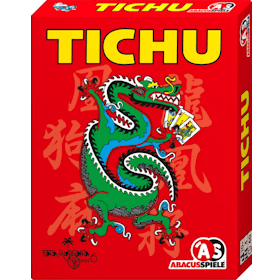Tichu
 Tichu przejął wiele zasad i mechaniki od Zheng Fena. Jest to partnerska, postępująca gra karciana, a celem gry jest pozbycie się ręki, najlepiej podczas zdobywania punktów.
Tichu przejął wiele zasad i mechaniki od Zheng Fena. Jest to partnerska, postępująca gra karciana, a celem gry jest pozbycie się ręki, najlepiej podczas zdobywania punktów.
Talia jest standardowym pakietem 52 kart z dodanymi czterema kartami specjalnymi: pies, feniks, smok i Madżong (1). Kiedy nadejdzie twoja tura, możesz albo pobić aktualną kombinację wierzchnich kart – pojedynczą kartę, parę kart, sekwencję par, fula itp. – albo spasować. Jeśli gra przechodzi z powrotem do gracza, który położył pierwsze karty, zdobywa lewę, usuwa karty i może wyjść z następną. Wyłożona karta określa jedyną kombinację kart, którą można zagrać w tej lewie, więc jeśli zagrana zostanie pojedyncza karta, zagrywane są tylko pojedyncze karty; jeśli położony zostanie strit składający się z siedmiu kart, wtedy można zagrać tylko siedmiokartowymi stritami itd.
Liczba graczy: 4
Czas gry: 32 mn
Złożoność: 3 / 5
Zagraj w Tichu i 1223 inne gry online.
Bez ściągania, bezpośrednio z twojej przeglądarki.
Ze swoimi przyjaciółmi i tysiącami graczy z całego świata.
Darmowe.

Zagraj w Tichu i 1223 inne gry online.
Bez ściągania, bezpośrednio z twojej przeglądarki.
Ze swoimi przyjaciółmi i tysiącami graczy z całego świata.
Darmowe.

Streszczenie zasad
Gameplay
Each player sits across from their teammate so that play alternates between the two teams.
The game is played with a deck of 56 cards, consisting of a 52-card deck of four suits (Jade, Sword, Pagoda, Star) plus four special cards (Mah Jong, Dog, Phoenix, Dragon). A standard 52-card deck with 4 jokers (marked to indicate the special cards) can also be used.
Each player is dealt eight cards and may call "Grand Tichu," a 200-point bet that they (not their partner) will be the first player to get rid of their cards. Once players have decided whether to make this call, six more cards are dealt (the remaining cards in the deck) and players may no longer declare "Grand Tichu." Now, and at any time prior to playing their first card, a player may call "Tichu," a 100-point bet that they (not their partner) will be the first player to get rid of their cards. The differences between Grand Tichu and Tichu are when they may be called, the number of cards you've seen, and the number of points involved.
All players prepare three cards for simultaneous exchange, with each player passing one card to each of the other players—one to each opponent and one to the partner. Should a player declare "Tichu" before the simultaneous exchange, players are allowed to change their out-going exchange cards.
After the card exchange, the player with the Mah Jong card leads the first trick. In Tichu, playable card combinations are generally based on Poker hands, with some exceptions. A player may pass on a trick with the option to play in later, and a trick is completed if it is passed three times in a row.
Playable card combinations
- A Single card
- A Pair (equal cards)
- A Sequence of pairs of adjacent values
- A Triple
- A Full House (triple + pair)
- A Run at least five cards long
Bombs
Bomb are special combinations which will beat any card combination with the exception of a bigger bomb. Bombs may be played at any time (even out of turn) to end a trick, with every player given a chance to play bigger bombs before the trick is taken.
Bomb combinations:
- Four of a kind
- A straight flush of at least five cards
Special Cards
The Mah Jong The player with the Mah Jong leads the opening trick, but is not required to play Mah Jong in the trick. The Mah Jong may be played as a 1, either by itself or in straight. When the Mah Jong is played, you may make a "Wish" (request a card number 2-A). The wish remains active until it is fulfilled. Any player that does not have the card value asked for, or cannot play it, can then play any suitable card or pass. This wish remains in effect until someone fulfills it. Mah Jong is worth 0 points.
The Dog has no numeric value, and cannot be played in a trick. The Dog must be played as the lead card, and passes the lead to your partner. If your partner is out, play passes to the active player after your partner's position. It is not possible to steal the lead in any way, as such, bombing the dog is not allowed. A Dog is worth 0 points.
The Phoenix may be played alone as .5 higher than the previous card played (i.e. after A, Phoenix is played as A.5), or as a wild card in a combination (with a value from 2-A). The Phoenix cannot be included as a wild card in a bomb, is not a wild card as a single play, has only a value of 1.5 when played as lead, and it doesn't count as .5 higher when used in a straight. The Phoenix is worth negative 25 points.
The Dragon is the strongest card and may only be played in a single card trick. The player wins the trick unless the Dragon is bombed. If the trick is won with the Dragon, the trick is given to your opponent (you choose which one). Furthermore, if the dragon is bombed, the player who played the largest bomb on the trick takes the entire trick for themselves (which includes the dragon). Furthermore, it is impossible to use the dragon in order to win the dog. The Dragon is worth 25 points.
Round End and Scoring
A round ends when only one team is left with cards
Teams gain or deduct points for Grand Tichu (±200 points) and/or Tichu (±100 points) calls.
If both players on a team get rid of all their cards before either player on the opposing team is out of cards, the winning team scores 200 points and there is no card scoring this round.
The last player out gives their remaining cards to the opposing team and gives all the tricks they have won this round to the first player out.
Points are scored based on the cards in the tricks won by each team. Kings and tens are worth ten points each, fives are worth five points, the Dragon is worth 25 points, and the Phoenix is worth negative 25. All other cards score zero.

